by Harvey Mossman
Design: Mark Herman
Publisher: GMT games
“We will leave this war to our children “, King Archidamus’ prophetic retort to the Spartan assembly at the opening of the 2nd Peloponnesian war sounded the alarm that the conflict would be generational. His compatriots did not agree and thought an easy victory would be had, yet the war lasted 27 years, cost thousands of lives and fundamentally changed the Greek civilization. How do you simulate such a cataclysmic event? Wargame designers have tried for years to simulate this tragic epic. Now, acclaimed designer Mark Herman brings us a fresh perspective on both the 1st and 2nd Peloponnesian wars, seamlessly meshing the politics of the polis with the wider military conflicts in a unique design that captures the challenges of the era.
Overview of the Rules System

Pericles plays as if 2 games are rolled into one. The basic premise of the game revolves around the political competition between each of the 2 main factions, the Aristocrats versus Demagogues in Athens and the Eurypontid kings versus the Agiad Kings in Sparta. Best played with 4 players, 2 Athenian and 2 Spartan, each side will have internal debates in their respective Assemblies about Military, Diplomatic and Allied League issues, the outcome translating into specific actions during conflict in the various theaters of ancient Greece. Honor for each faction, the ultimate determinant of Victory, will be gained or lost both in the assemblies and on the battlefield. Each player will compete to best his political rival in his own city state but there is a constant tension between the need for personal gain and the requirements for successful prosecution of the war. In other words, one faction’s greed and ambition can lead to stalemate in the Assembly adversely affecting the overall war aims resulting in a disastrous defeat for your city state. But you cannot win if your city state loses, so discretion may be the better part of Honor and you had better work with your rival to ensure military victory. To his credit, Mark Herman superbly blends 2 subsystems into a seamless transition from political context to military conflict which ultimately will decide the hegemon of classical Greece.
The Play’s the Thing
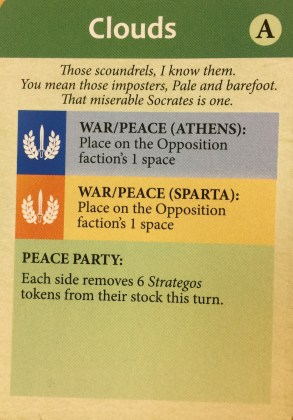
Let’s first take a look at the political arena. Initially the players draw an Aristophanes Card from the Aristophanes deck. It is here that the famous playwright “sets the stage” for the political and military theater that is to unfold for the rest of the game turn. It does this by announcing certain Random events such as The Plague or sets out certain objectives as demanded by the Will of the Assemblies. Moreover, it may force certain Issues into play such as War/Peace. Finally, it may place certain restrictions on resources available to each side by limiting the number of Strategos in each players pool. The Aristophanes cards allows the designer to mold the overall course of the war without it becoming scripted, gently nudging the conflicts along their historical timelines. Each particular card has 3 different versions enhancing variability and replayability.
All Politics Are Local
Players now form a hand of 9 cards, each one representing a famous politician of the era. They have the option of forming an Entourage of 3 cards that can be used as “an ace up your sleeve” during a crucial debate or as a dumping ground for less useful cards. The remaining 6 cards and the constant one card Faction Leader form their hand. Each card has an associated value from 1 to 5 which is used when issues are debated. To debate an issue, factions alternate selecting an issue on the Assembly Board and then playing a card hopefully causing the issue to move along the Assembly track a number of spaces equal to the difference between the 2 values played. When an issue is on your side of the Assembly Track, it is considered captured by you and you will control how it is used. Those of you familiar with Herman’s World War II design, Churchill, will quickly recognize this mechanic.

It certainly sounds simple enough but the designer has deviously added some political intrigue to the debates. You see each politician has a particular issue that is near and dear to his heart and therefore gets a bonus to his card value if it is used to debate that issue. Additionally, he also gets a bonus of Strategos (more on this in a minute) if his card is used to debate that issue. Common sense dictates that you want to use each card to its fullest effect by playing it on the issues that gives it the best bonus in value and Strategos awards, however, your wily opponent is likely to do the same. Herman has fiendishly balance the card values and their bonuses to an average sum of 5. What does this mean? If both factions are playing their cards to get the most value in bonuses and Strategos, they will more often than not cancel each other out resulting in no net movement of the issue which usually leaves it in the zero space in the Assembly Track not captured by either faction and therefore not able to be utilized in the war. Since you need to capture issues to prosecute the war and you need Strategos to activate the issues, trying to maximize one will often lead to a deficit in the other. But that is not all there is in the mix, because the Faction that wins the most issues in the Assembly will become the Controlling Faction with certain perks that accrue during the turn. Additionally, the player who has the most net value of issues on his Assembly Track gains Oration Honor equal to the difference (up to a maximum of 3) while his opposing faction loses the same (in the political arena, Honor changes in this game are always zero-sum). Since winning the game is strictly determined by highest Honor, players will invariably try to partly achieve this in the political arena.

So here lies the wonderful political conundrum that Mark Herman has devised. Players of each faction must cooperate to some degree to avoid leaving issues uncaptured by either faction, otherwise they risk having too few issues to prosecute the war. At the same time, they must try to maximize their accrual of Strategos since these are desperately needed (and always in short supply) to activate the issues in the military part of the turn. And in balancing these problems, they must try to accumulate Honor at the expense of their compatriot to achieve victory. How the factions cooperate and to what degree is a crucial aspect of the political drama unfolding and provides marvelous tension and anguished choices during each debate! Kudos to Herman for devising such a nefarious interplay of factors!
there is a constant tension between the need for personal gain and the requirements for successful prosecution of the war
There’s a total of 6 rounds of debates during the Assembly Phase after which each faction claims ownership of the issues he has captured. Let’s now take a look at some of these issues. Essentially there are 4 main issues that allow actions to prosecute the war: Military, Diplomatic, League, Oracle.
Oracle – the owning faction can choose to gain 3 Honor
or gain one Honor and remove an enemy league unit from any theater
or place one Treachery Marker in 3 theaters anywhere on the map. (Treachery markers represent rebellions in that theater and add to military and diplomatic strength)
Diplomatic – this allows the player to try to convert an enemy base,
or win over the few neutral theaters on the board
or remove friendly or enemy Treachery Markers.
League – this allows players to construct a friendly base and gain 2 Honor for the Controlling Faction
or convert a league base to a city state base and gain 2 Honor for the Controlling Faction
or build League military units in areas where there is a friendly league base.
Military – this allows players to conduct Raids
or build city state military units
or assemble an expedition for military combat.
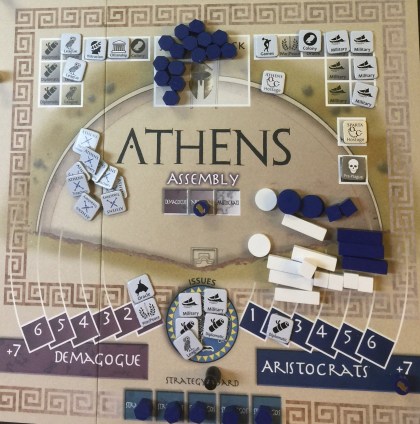
There are a few other issues in the game specific to each city state such as Citizenship and Colony for Athens and Krypteia and Agoge for Sparta however these are one time use and do not have a tremendous effect on the military aspect of the game. There is also an Ostracism issue when you desperately need to become the Controlling Faction and an Olympic Games Issue that gives you 3 honor if at Peace and 3 Strategos if at War.
Leave the Politics to the Politicians and the Fighting to the Generals
It is in the Theater phase that the war is decided. The game map depicts 20 Theaters stretching from Sicily in the West to the Hellespont in the Northeast encompassing all the major areas of conflict. In descending Honor order, players alternate placing one issue face down in any appropriate theater. They also have 2 Rumor markers which act as bluffs. Once the first issue is placed in the theater, all subsequent issues placed there are put on top forming a stack that will be resolved in a first in, last out queue. Placement and timing are everything. As issues are placed, opponents will slowly get an idea in what theaters you are focusing your war aims and may thereby be able to divine your strategy for the turn. Therefore, bluff and indirection are paramount giving an unique feeling of strike and parry as issues are being placed.
However, timing may even be more important! Issues placed early will end up at the bottom of the queue resolving later in the turn. Consequently, if you want an event to happen immediately place it last i.e. near the top of the stack. I’ve played many a game where factions of the same side incorrectly coordinated the timing of their issues bringing the whole strategy to a halt. So… let me say this one more time, Timing Is Everything!
You will find that this part of the game is a delicious exercise in bluff, strategy, misdirection, and forethought giving it an almost chess like focus. There is tremendous tension as you attempt to execute your plans while trying to divine your opponent’s objectives. It’s one of my favorite aspects of the game. Herman has devised an intriguing game mechanic that challenges all players every turn.

Once all the issues are placed they now must be resolved. Again, in descending Honor order, players alternate selecting one of their issues in any theater as long as it is top of the stack. Most issues will require Strategos to implement hence the need for Strategos accrual in the political part of the turn. Each faction keeps his own pool of Strategos earned and when an issue is turned face up, the player who captured that issue in the Assembly phase makes all decisions about the issue and spends his Strategos to implement it. You will find that your faction’ s Strategos are quickly depleted so smart decisions on issue resolution priorities and budgeting are absolutely necessary. I will never forget my first game where, as the Aristocrats, I launched a military expedition to Sicily to achieve a Will of the Assembly objective. In the most unlikely an astounding battle, Athens cleared Sicily of all Peloponnesian league units! Even my timing was perfect as I had cleverly placed a Diplomatic issue early on so it would be the last issue played in the Sicilian theater. I planned to use this to convert the last remaining enemy league base to a friendly one thereby greatly pleasing the Assembly back on the Pnyx. Instead, the Fates destined me to return home in shame as I was one Strategos short of implementing the Diplomatic issue. It resulted in a 20 point Honor swing against my compatriot and I and was a tragedy of Homeric proportions (especially as my Spartan opponents kept laughing and contemptuously looking for that last Strategos which may have fallen on the floor!).
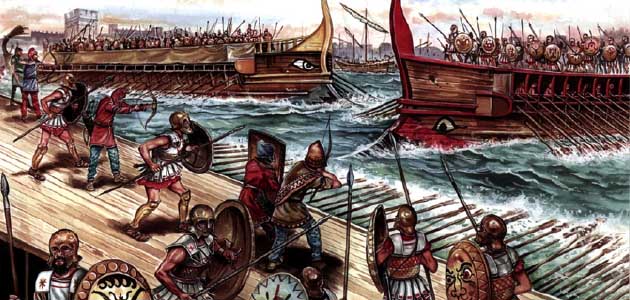
Now let’s look at another one of Herman’s clever design implementations. We must remember that each turn of the game represents a span of 3 to 5 years and that a given military campaign would last several months or even years. The strategic scope of the game necessitates that campaigns and even individual battles be somewhat abstracted. Yet the design allows players to have climactic and strategically decisive battles.
A military campaign at this time usually began with the assembly of forces needed to undertake it. The game has cubes of various colors representing the hoplite land units of each city state and their allied leagues. Navies are represented by rectangular wooden blocks, and bases as wooden disks. Nominally all military units are worth one strength point, bases are worth 2 but appropriately, Spartan land units and Athenian naval units are worth 2. Thus, Sparta dominates the land and Athens the sea.
In Expedition Assembly, the controlling player and his compatriot may commit 0 to 9 Strategos and move an equal number of friendly units anywhere on the board by any circuitous route in an attempt to enter the battle theater. Now I know it sounds strange that you can move units from anywhere but one must remember the timescale would allow such distances to be traversed. The Guiding rule is units may not exit any theater occupied by enemy units without leaving behind a value of military units equal to the enemy. Herman has designed a color-coded transit system connecting the theaters that determines what type of units may transit and what type of units must be left behind to match enemy units. I found that, for some, this is the most difficult part of the game to wrap their head around. It is crucially important to understand this mechanism to be able to properly position your own units to impose movement restrictions on the enemy and block potential enemy access. The system is elegantly designed and not that difficult once you think about the underlying logic. Nevertheless, it takes some getting used to.
As issues are placed, opponents will slowly get an idea in what theaters you are focusing your war aims and may thereby be able to divine your strategy for the turn. Therefore, bluff and indirection are paramount
Once your expedition is assembled, the battle proper can begin. At the same time the attacker committed Strategos to the battle, the defenders do the same though without revealing their commitment to the attacker. once Expedition Assembly is complete, the defender’ s Strategos are committed. Now we do a little math. We sum the number of each sides committed Strategos and friendly treachery markers plus the military value of friendly units, then pick one politician card and add its value to the total. Higher total wins and losses are determined by the difference in the values. There is a chart that determines which units are lost by the winner and loser based on the and unit types involved. Honor is gained by the victor and lost by the loser, hostages may be taken if Athenian naval vessels or Spartan hoplites are eliminated. If one side loses 5 Honor in a single battle, he has suffered a Major Defeat and the War/Peace issue is immediately placed on his city state Assembly display on the opposition’s track. The victor can decide if a second battle is to take place
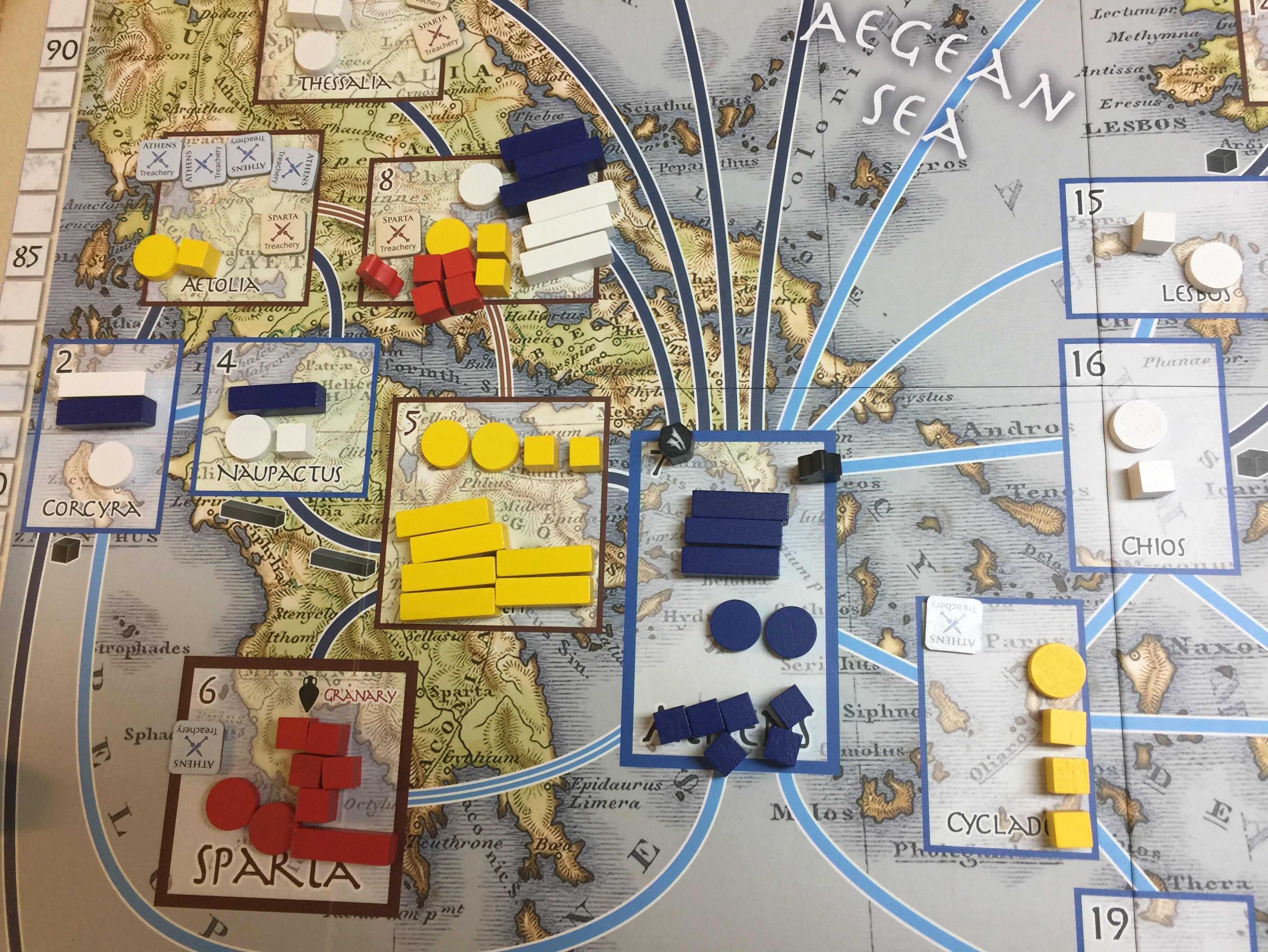
The theaters are outlined in the either brown or blue indicating that land battles are prioritized when brown and naval battles are prioritized when blue. In any given battle, the player must first fight the prioritized battle before fighting the other. Additionally, bases in an area may not be destroyed by combat unless all enemy units, land and naval, are cleared from the area. This beautifully simulates the protective effect of Athens fleet and Spartans powerful army. For example, Athens need only keep a respectable fleet in the Athens theater to protect its bases there. Sparta must come in with a sizable naval force to defeat the Athenian fleet before there could be a 2nd battle involving land units that could destroy the hoplites in Athens. A simple mechanic that obviates the need for complex siege and fortification rules.
Once all the issues on the board have been resolved play moves to the End Phase where Victory is determined. Victory can occur if Athens no longer has access to certain Granary theaters on the board or, rather obviously, if one city state is captured. There is also an Automatic Honor Victory if the controlling faction of one side is far ahead of his opponents in Honor. Usually the game is decided by political, economic and geographic bonuses to individual faction Honor at the end of any scenario. The winner is the player with the most Honor from the winning city state.

If there is no victory, the game proceeds to a Maintenance Segment where friendly bases are counted to support a number of military units on the board. If insufficient,, excess military units are removed.
Most importantly, there is a Redeployment segment where friendly units can move anywhere on the board to friendly bases with certain minimal restrictions. Woe to the commander who does not understand the implication of this segment! Units can move anywhere unrestricted by the movement limitations during Expedition Assembly. For example, a Spartan base in the Hellespont can be massively reinforced with Land the Navy military units even though they would not be able to normally get there during Expedition Assembly. Players must be acutely aware of this as redeployment allows players to totally shift the focus of the war from an area where they would normally be contained to another distant theater beyond their normal reach. Do not underestimate redeployment!
There are many other items I have intentionally glossed over which add necessary historicity and flavor. Persia makes its entry into the war, special units are available for Argos, Alcibiades, the Athenian State Ship and Spartan Foot Calvary. Some of these, such as a Spartan Foot Calvary, can have a great effect.
A War Like No Other
If you haven’t already guessed from reading this article, successful play of this game requires deep thought, a bit of intuition and creative analysis. I will try here to give you some insights into some successful tactics. A strategy article will likely be produced in the next few months.

The Diplomatic Issue – this is one of the most powerful issues in the game. It allows conversion of enemy bases and, and even if unsuccessful, results in the placement of treachery markers if the Diplomatic issue fails . Here’s how it works. This issue can be played anywhere on the board in a contested or enemy -controlled theater. Players spend 3 Strategos and add this to any friendly Treachery markers in the theater. If this value exceeds the military value of enemy units plus twice the number of his bases, an enemy base will convert to a friendly league base. Quite often, Athens will find itself militarily stretched as it has a much greater number of bases compared to the Spartans. It is difficult to keep all their bases adequately garrisoned with at least 3 strength points to make them immune from the first Diplomatic attempt. Now if the diplomatic issue fails, the resolving player can place a number of friendly Treachery Markers equal to the number of Strategos committed. This greatly improves the chances of success for a subsequent diplomatic issue resolved later in the turn. Watch the Athenian white robes turn yellow as you play several Diplomatic Issues in a specified theater! At the least, it will force the Athenian player to over garrison his bases or force him to play his own Diplomatic Issues in the theaters to remove enemy Treachery Markers.
The Oracle Issue – a great use of the Oracle issue is to place one treachery marker in each of 3 theaters anywhere on the map. As a precursor to a later played Diplomatic Issue, it makes theaters with bases vulnerable because 3 Strategos plus the one Oracle treachery marker will give you a value of 4 in a space where normally the Athenian player only has 3 military value. This is extremely threatening to the Athenians. So forgo the Honor gain options for the most part and place Treachery! Of course, occasionally, you can use this to gain 1 Honor and remove an enemy league unit. This weakens an area for combat or Diplomatic conversion but has the disadvantage of not threatening multiple areas.

The Military Issue – sure we all want to have fun and kill something but often this is not the best use of the Military Issue. Battles in this game can be near run things and the loss can be devastating both in military units killed and reduction of Honor. Often a better use of the Military issue is to conduct a Raid. This can be played in a contested area where the commanding general commits 3 Strategos, receives 3 Honor and picks the top card in his city states battle deck. The enemy controlling faction loses Strategos equal to the card’s value. On average, you will take 3 Strategos from your opponent but sometimes more if you are lucky and pick a high card. This is a wonderful way for you to gain Honor and deplete your opponent’s Controlling Faction Strategos pool hampering him in later issue resolutions. Presumably, he controls more issues than his compatriot which is why he is the controlling faction. Therefore, you are reducing the more potent of your opponents by attrition of his Strategos.
Also, the Military Issue played in your home city state is the only way to build Athenian or Spartan units on the map. Building Spartan land units presents Athens with a formidable and almost undefeatable hoplite army. Similarly, there is never enough Athenian naval units available for all the things they are needed to do. So my advice is to build early and build often to get your full complement of available units on the board as quickly as possible.
A Game Like No Other
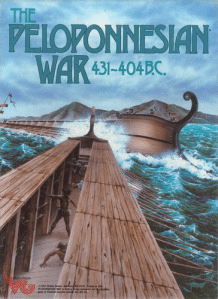
Attempts to simulate the decades long conflicts between Athens and Sparta have been tried in the past and, to my mind, have mostly been unsatisfying. Indeed, Mark Herman has previously designed an earlier game on the Peloponnesian war published by Victory Games which had some very unique elements but in my opinion, his current endeavor greatly surpasses it. Ultimately games suffer from the difficulty of time and space mismatch and the capriciousness of the politics of the era. The war lasted 27 years and was fought over vast distances. Furthermore, Political factions vied for supremacy, rising and falling from power and influence. The oscillations and political dynamics greatly affected decisions about grand strategy, particularly in times where unifying leadership was deficient. It is difficult to find a consistent point of reference for strategy and military campaigns in this setting. Campaigns that should never have been launched sometimes led to unforeseen victories but, more often, alarming disasters. Mistakes were made on the tactical and strategic level compromising successful conclusion of grand strategies. This all makes the conflict annoyingly difficult to simulate.

However, I feel that Herman has done a masterful job in pulling all these elements together. He has managed to simulate tremendous tension in the political dynamics of the time with simple but subtle mechanics whose interplay challenge players with difficult decisions, instilling tension in every turn. His unique mechanics transition you from the political arena to the military conflict in a thought-provoking, tense, subtle dynamic that makes you relish each turn of the game.
Of necessity he has abstracted much, particularly the military aspects given the broad sweep of time, yet he has managed to invent a provocative and intensely satisfying, broad brushed picture that truly represents the problems both sides faced during the conflict. In this game, the Athenian players will feel the pain of fighting a war against an opponent who dominates on land. Likewise, the Spartans will be frustrated in their attempts to conquer the Athenian Empire without making a massive effort to challenge their fleet.
As Thucydides states his works were a gift to all time, then I give the same high praise to Mark Herman’s Pericles. It is truly a gift of incredible design and, at least for me, will be enjoyed for ages to come!
About the Author
Harvey Mossman has been playing wargames since the age of 13. While earning his degree in Medicine, he continued to write historical articles, lecture on military history, design wargames and amass a truly staggering collection of conflict simulations. He is one of the editors of TheBoardgamingLife website and runs an annual wargaming convention on Long Island New York on the Friday after Thanksgiving affectionately known as FaTDoG (Friday After Thanksgiving Day of Gaming). He is also a regular contributor to Grognard.com, a renowned wargaming website.
Related Articles:
JULIUS CAESAR – A Boardgaming Life Review and After Action Report


This is possibly the best review I’ve read so far of this game. It covers every aspect of it and really does show how different this game is from any other of its type. The review nicely presents the aspects of this game which I love and keep me coming back to playing. One thing I would add to this is how well designed the Phormio “bots” are designed for less than 4 player plays. It’s an elegant system all around.
An excellent review of what seems an extraordinary game. I wonder if the design has taken some inspiration from Republic of Rome, in placing players in an historical and cultural environment, and essentially compelling them to work together in some areas whilst being in competition for overall supremacy. I’ve heard nothing but good things about this project, and right now, it may be the finest example of a game that meshes the feel of an age with the time honoured constants of brute strength and political and military acumen and subterfuge.
As mentioned by Brian I feel that Phormio (and Brasidas) should have been also mentioned as this is the real 3rd part of the game.
As we know it’s not always easy to find 4 opponents. The Phormio bot (AI) can be used to substitute up to 3 players making this game a solitaire. An extraordinary achievement for a game of this scope!
Secondly, the Phormio bots’ strategy (one for Sparta and a different one for Athens) is so good that – as Mark himself pointed out in his latest article on Inside GMT – Phormio can be used to learn and master the game. If you don’t know what to do just ask – What would Phormio do? Analyse its logic and reasoning and modify to your needs. The amount of work that went into this system alone is astonishing and I have never seen anything like this in a boardgame.
Superb game.